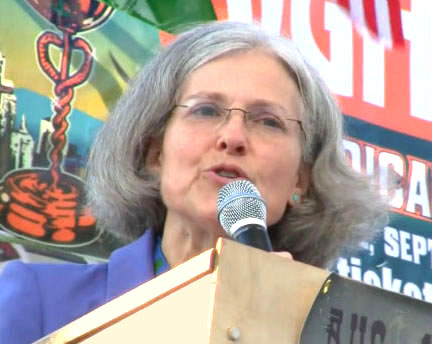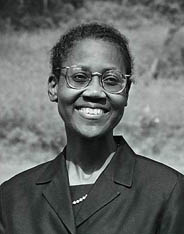 |
||||||

Dr. Jill Stein, 2012 Green Party Presidential Candidate calls for legalization of marijuana |
Marijuana: Forbidden MedicineSteuben Greens Community Forum
Dr. Jennifer Daniels spoke on the medical properties of marijuana, their efficacy compared to legal drugs, and a current bill to legalize medical marijuana in New York at a well-attended community forum on Marijuana: The Forbidden Medicine, Friday, April 2, 2004, in Bath. The forum, sponsored by the Steuben Greens, was featured in articles in the Corning Leader and the Steuben Courier Advocate, and footage from the forum appeared on Channel 36 and Channel 18 TV. Dr. Daniels, from Syracuse, is a graduate of Harvard University, the University of Pennsylvania School of Medicine, and the Wharton School of Business. She grew up on the South Side of Syracuse, New York. After completing her education, she returned to the South Side determined to help reclaim the area. She was the Green Party's candidate for mayor of Syracuse in 2000 and Lt. Governor of New York in 2002. Press Coverage of April 2, 2004 Community ForumLegalizing MarajuanaWENY TV, April 2, 2004, 11 at 11 Across the nation, the debate is still going in the decision to legalize marajuana for medical purposes. The dispute has now spread to the Southern Tier as a Syracuse physician spoke to the Bath community on the benefits of the drug. Doctor Jennifer Daniels the says the drug has been proven beneficial for patients suffering from cancer, painful central nervous system diseases, and AIDS/HIV. The drug has been outlawed more than 60 years but Daniels says State Legislatures are taking steps to make sure those who need it medically may be able to use it. Community Forum on Marijuana: The Forbidden MedicineSteuben Courier Advocate, March 14, 2004 A community forum on marijuana will be held Friday, April 2nd, 7 p.m. at the Dormann Library, 101 West Morris Street, Bath. Jennifer Daniels, M. D., will speak on the medical properties of marijuana, its efficacy compared to legal drugs, the historical use of marijuana as a medicine, a current bill to legalize medical marijuana in New York and recent attempts to patent the active chemicals in marijuana. Discussion after the presentation. Free and open to the public. Sponsored by the Green Party of Steuben County. For more information, visit our website, www.steubengreens.org, or call 607-569-2114 Medical Marijuana Legislation Advances in New YorkA bill that would legalize the use of medical marijuana in certain circumstances in New York state passed one of its first legislative hurdles recently in Albany. The city councils of Albany and Buffalo have adopted resolutions in support of the bill, and a New York City Council resolution in support is moving forward. The medical marijuana bill, A0576, was okayed by the Assembly's Health Committee on February 24 with an 18-6 vote a day after dramatic and sometimes wrenching testimony before the committee, including some from surprising sources. "If you have ever seen anyone on their deathbed, dying in agony, screaming in pain every day as I had with my father who had cancer, the risks of smoking marijuana are outweighed by the therapeutic benefits," conservative Assemblyman Robert Prentiss ( R-Colonie ) told his colleagues. The assembly bill, first introduced in 1997, would allow doctors to prescribe marijuana for patients suffering life-threatening, degenerative or disabling diseases such as cancer, multiple sclerosis and AIDS. The bill is rapidly picking up bipartisan support in the Democratic-dominated Assembly, with 41 Democrat and seven Republican cosponsors. It is now headed for the Assembly Codes committee, then the Ways and Means committee before coming up for a floor vote. The legislation is attracting broad support. The Middletown, NY Times Herald-Record reported on Feb. 25, 2004 ( "Medical Marijuana Bill Gains Kirwan's Support") that "A leading law-and-order Assembly Republican says it's high time New York made marijuana available for medicinal use. Assemblyman Tom Kirwan, a former State Police lieutenant who is considered one of the most conservative members of his house, joined a growing number of Republicans yesterday in co-sponsoring a Democratic bill to legalize medicinal marijuana. 'If that's going to ease their pain, how can you be against it?" said Kirwan, R-C-Newburgh. "A litany of well-regarded medical associations and publications say marijuana in its natural form is more effective in treating a variety of symptoms than the synthetic pill version prescribed since 1986." Even though some of his colleagues are hesitant, Assembly Senate Majority Leader Joseph Bruno ( R-Brunswick ), said his chamber will also consider the bill. "We're going to look at that," he told the Albany Times Union Tuesday. "We're very aware that there are addictive substances that have a medical value." The broad support for the bill in the state's medical community may help ease Republican fears. So far, the bill has been endorsed by medical societies in New York, Westchester, Putnam, Orange, Rockland and Duchess counties, and it is being supported by the state Health Department's AIDS Advisory Council, the New York State Association of County Health Officials, the New York State Nurses Association, the Hospice and Palliative Care Association of New York State, the Statewide Senior Action Council, Gay Men's Health Crisis and the New York AIDS Coalition. Despite those endorsements, Gov. George Pataki ( R ) remains opposed. "The Health Department tells us, and many health experts agree, that there are already approved legal medications in place that treat symptoms like nausea and help deal with pain management," a Pataki spokesman told the Times Union. He did not identify those health experts. Meanwhile, the city councils of Albany and Buffalo have passed resolutions supporting a medical marijuana bill, and the New York City council has taken steps in that directions as well. The New York City Council's health committee heard testimony at the end of February from a number of patients and doctors, including testimony from National Review editor Richard Brookhiser, who told of his struggle with testicular cancer and chastised committee conservatives for failing to support the resolution. Bronx resident Ann Wilson provided some of the hearing's most moving moments, though, as she described how her brother had used marijuana to ease the side-effects of chemotherapy for pancreatic cancer before he died two years ago. "How can we deny marijuana to our friends and loved ones when it has the potential to ease their pain and possibly prolong their life?" an emotional and tearful Wilson asked. Visit http://assembly.state.ny.us/leg/?bn=A05796 to read the text and legislative history of the medical marijuana bill online. Party will discuss medical marijuana The Corning Leader, March 31, 2004, by Mary Perham BATH | A nationwide debate over the legalization of marijuana for medical purposes will be visited Friday evening at the Alice and Henry Dormann Public Library. A 7 p.m. forum, hosted by the local Green Party, on growing support for prescriptive marijuana will feature Dr. Jennifer Daniels, a physician and social activist from Syracuse. "(We want) to draw attention to the issue of medical marijuana," said Steuben County Green Party Chairwoman Rachel Treichler. "At a time of skyrocketing drug costs, it makes no sense to outlaw an effective and inexpensive drug that has been safely used for thousands of years." The Green Party candidate for state lieutenant governor in 2002, Daniels is slated to talk about the medical properties of marijuana and its usefulness compared to legal drugs. She will give an update on a bill now before the state Assembly to legalize medical marijuana. Supporters of the bill say marijuana has proven to be therapeutic for patients with cancer, painful central nervous system diseases and HIV/AIDS. The bill has gained strong support in the Assembly and across the state. The cities of Buffalo and Albany have adopted resolutions favoring the use of marijuana as a prescriptive medication. Marijuana - or cannabis - has been the subject of controversy for a number of years. Outlawed for more than 60 years, it's considered an addictive substance. It is relatively inexpensive but can potentially lead users to stronger illegal narcotics. It has been associated with "reefer madness," Bohemian lifestyles and the drug culture of the '60s. Yet a growing number of medical associations are giving the drug qualified approval for use in offsetting the side effects of treating cancer and other diseases. Those reactions are now treated with more conventional - and costly - prescription drugs. One such prescription, Emend, is used for patients suffering the immediate ill-effects of chemotherapy. The three-day treatment costs $250. Opponents of the current plan argue legalizing marijuana for medical purposes would lead to higher crime, drug store break-ins and misuse of prescriptions. Many say there is no need to use marijuana because other prescriptions are available. U.S. drug czar Barry McCaffrey has said, "There is not a shred of scientific evidence that smoked marijuana is useful or needed." Yet agencies such as the American Medical Association disagree.In a 2001 report, the AMA noted the drug effectively could be used as a treatment, to enhance other drugs or for those suffering chronic pain and insomnia.The AMA cautioned studies to date were inconsistent, largely because they measured "crude plants of variable potency" and included experienced and new smokers. It called for a controlled, clinical study of marijuana.The National Academy of Sciences' Institute of Medicine also endorsed marijuana for possible use as medicine.Both national health agencies voiced concern about smoking marijuana as opposed to consuming it. "Marijuana is not a completely benign substance," said the IOM report. "It is a powerful drug with a variety of effects. However, except for the harms associated with smoking, the adverse effects of marijuana use are within the range of effects tolerated for other medications." Provisions in the Assembly bill include allowing a licensed practitioner to certify a patient has a serious condition that should be treated with the medical use of marijuana. If approved by the state Department of Health, the patients would be allowed a month's supply of marijuana with five refills before a new certificate would be issued.
|
|
|
|
Home | About the Green Party | Calendar | Email: info at steubengreens.org
|
